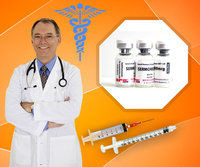Introduction
Secondary hypogonadism, a condition characterized by low testosterone levels due to dysfunctions in the hypothalamus or pituitary gland, has been increasingly recognized for its impact on various aspects of men's health. Among these, the relationship between secondary hypogonadism and mood disorders in American men has garnered significant attention. This article explores the intricate connection between these two conditions, shedding light on the potential implications for diagnosis and treatment.
Understanding Secondary Hypogonadism
Secondary hypogonadism arises when the brain's signaling to the testes is disrupted, leading to reduced testosterone production. This can be caused by a variety of factors, including tumors, infections, or head injuries affecting the hypothalamus or pituitary gland. The resulting low testosterone levels can manifest in numerous symptoms, ranging from decreased libido and fatigue to changes in mood and cognitive function.
The Prevalence of Mood Disorders in American Men
Mood disorders, such as depression and anxiety, are prevalent among American men. According to the National Institute of Mental Health, approximately 6 million men in the United States suffer from depression each year. These conditions can significantly impact quality of life, relationships, and overall well-being. Understanding the factors that contribute to mood disorders is crucial for developing effective interventions.
The Connection Between Secondary Hypogonadism and Mood Disorders
Emerging research suggests a strong link between secondary hypogonadism and mood disorders in American men. Studies have shown that men with low testosterone levels are more likely to experience symptoms of depression and anxiety. Testosterone plays a vital role in regulating mood and emotional well-being, and its deficiency can disrupt these processes.
A study published in the Journal of Clinical Endocrinology & Metabolism found that men with secondary hypogonadism had significantly higher rates of depression compared to those with normal testosterone levels. Another research in the International Journal of Impotence Research demonstrated that testosterone replacement therapy improved mood and reduced symptoms of depression in men with hypogonadism.
Mechanisms Underlying the Connection
The exact mechanisms by which secondary hypogonadism contributes to mood disorders are not fully understood, but several theories have been proposed. Testosterone influences the production and function of neurotransmitters such as serotonin and dopamine, which are crucial for regulating mood. Low levels of testosterone may lead to imbalances in these neurotransmitters, increasing the risk of depression and anxiety.
Additionally, testosterone affects brain regions involved in emotional processing, such as the amygdala and prefrontal cortex. Reduced testosterone levels may alter the function of these areas, contributing to mood disturbances. Furthermore, the physical symptoms of hypogonadism, such as fatigue and decreased energy, can exacerbate feelings of sadness and hopelessness, further contributing to mood disorders.
Implications for Diagnosis and Treatment
Recognizing the connection between secondary hypogonadism and mood disorders has significant implications for diagnosis and treatment. Healthcare providers should consider screening men with mood disorders for hypogonadism, particularly those who do not respond well to conventional treatments. Similarly, men diagnosed with secondary hypogonadism should be evaluated for signs of depression and anxiety.
Testosterone replacement therapy (TRT) has shown promise in improving mood and reducing symptoms of depression in men with hypogonadism. However, TRT should be used cautiously and under the guidance of a healthcare professional, as it can have potential side effects and risks. A comprehensive approach that addresses both the hormonal and psychological aspects of the condition may be most effective.
Conclusion
The link between secondary hypogonadism and mood disorders in American men is a critical area of research that warrants further investigation. As our understanding of this connection grows, it may lead to improved diagnostic strategies and more effective treatments for men suffering from these conditions. By addressing the underlying hormonal imbalances and providing targeted interventions, we can enhance the well-being and quality of life for American men affected by secondary hypogonadism and mood disorders.
Contact Us For A Fast And Professional Response

- Secondary Hypogonadism: Cardiovascular Risks and Management Strategies for American Men [Last Updated On: March 5th, 2025] [Originally Added On: March 5th, 2025]
- Secondary Hypogonadism and Sleep: Impacts and Management Strategies for American Men [Last Updated On: March 17th, 2025] [Originally Added On: March 17th, 2025]
- Secondary Hypogonadism and Energy: Impact and Management in American Males [Last Updated On: March 18th, 2025] [Originally Added On: March 18th, 2025]
- Genetic Factors in Secondary Hypogonadism: Impact and Implications for American Males [Last Updated On: March 19th, 2025] [Originally Added On: March 19th, 2025]
- Secondary Hypogonadism in American Men: Symptoms, Risks, and Management Strategies [Last Updated On: March 19th, 2025] [Originally Added On: March 19th, 2025]
- Chronic Stress and Secondary Hypogonadism in American Males: A Comprehensive Overview [Last Updated On: March 20th, 2025] [Originally Added On: March 20th, 2025]
- Secondary Hypogonadism: Impacts on Body Composition in American Men [Last Updated On: March 20th, 2025] [Originally Added On: March 20th, 2025]
- Secondary Hypogonadism's Impact on Prostate Health: Management and Monitoring Strategies [Last Updated On: March 20th, 2025] [Originally Added On: March 20th, 2025]
- Secondary Hypogonadism: Impact on Cognitive Health and Management Strategies [Last Updated On: March 20th, 2025] [Originally Added On: March 20th, 2025]
- Exercise as a Key Strategy in Managing Secondary Hypogonadism in American Males [Last Updated On: March 21st, 2025] [Originally Added On: March 21st, 2025]
- Managing Secondary Hypogonadism: The Vital Role of Comprehensive Support Systems [Last Updated On: March 21st, 2025] [Originally Added On: March 21st, 2025]
- Psychological Impacts of Secondary Hypogonadism: Mood, Self-Esteem, and Cognitive Effects [Last Updated On: March 22nd, 2025] [Originally Added On: March 22nd, 2025]
- Secondary Hypogonadism in American Males: Impacts and Management of Hair Loss [Last Updated On: March 22nd, 2025] [Originally Added On: March 22nd, 2025]
- Environmental Factors and Preventive Measures for Secondary Hypogonadism in American Men [Last Updated On: March 22nd, 2025] [Originally Added On: March 22nd, 2025]
- Secondary Hypogonadism in American Males: Causes, Symptoms, and Management Strategies [Last Updated On: March 22nd, 2025] [Originally Added On: March 22nd, 2025]
- Secondary Hypogonadism: Impacts on Skin Health and Treatment Options in American Men [Last Updated On: March 23rd, 2025] [Originally Added On: March 23rd, 2025]
- Secondary Hypogonadism in American Males: Symptoms, Diagnosis, and Management Strategies [Last Updated On: March 23rd, 2025] [Originally Added On: March 23rd, 2025]
- Secondary Hypogonadism: Impact on Physical Performance in American Men [Last Updated On: March 23rd, 2025] [Originally Added On: March 23rd, 2025]
- Secondary Hypogonadism and Anemia: Understanding the Link and Managing Health [Last Updated On: March 24th, 2025] [Originally Added On: March 24th, 2025]
- Secondary Hypogonadism in American Males: Impact and Importance of Mental Health Support [Last Updated On: March 24th, 2025] [Originally Added On: March 24th, 2025]
- Secondary Hypogonadism in American Men: Symptoms, Diagnosis, and Management Strategies [Last Updated On: March 24th, 2025] [Originally Added On: March 24th, 2025]
- Secondary Hypogonadism and Heart Disease: Risks, Symptoms, and Management in American Males [Last Updated On: March 24th, 2025] [Originally Added On: March 24th, 2025]
- Lifestyle Impact on Secondary Hypogonadism in American Males: Prevention and Management [Last Updated On: March 25th, 2025] [Originally Added On: March 25th, 2025]
- Secondary Hypogonadism: Understanding Its Profound Social Impact on American Men [Last Updated On: March 25th, 2025] [Originally Added On: March 25th, 2025]
- Secondary Hypogonadism: Impact on Libido and Treatment Options for American Males [Last Updated On: March 25th, 2025] [Originally Added On: March 25th, 2025]
- Secondary Hypogonadism and Diabetes: Insights and Management for American Men [Last Updated On: March 25th, 2025] [Originally Added On: March 25th, 2025]
- Secondary Hypogonadism: Impacts on Kidney Function and Management Strategies for American Males [Last Updated On: March 25th, 2025] [Originally Added On: March 25th, 2025]
- Sleep Disorders and Secondary Hypogonadism: Mechanisms, Impacts, and Management in American Men [Last Updated On: March 25th, 2025] [Originally Added On: March 25th, 2025]
- Secondary Hypogonadism's Impact on Muscle Strength in American Men: Diagnosis and Treatment [Last Updated On: March 25th, 2025] [Originally Added On: March 25th, 2025]
- Managing Secondary Hypogonadism: Symptoms, Diagnosis, and Treatment Strategies for American Males [Last Updated On: March 25th, 2025] [Originally Added On: March 25th, 2025]
- Exploring Alternatives to TRT for Secondary Hypogonadism Management [Last Updated On: March 25th, 2025] [Originally Added On: March 25th, 2025]
- Secondary Hypogonadism's Impact on Immune Function in American Men [Last Updated On: March 25th, 2025] [Originally Added On: March 25th, 2025]
- Emotional Impact of Secondary Hypogonadism on American Men: Symptoms and Solutions [Last Updated On: March 26th, 2025] [Originally Added On: March 26th, 2025]
- Understanding and Managing Secondary Hypogonadism in American Males [Last Updated On: March 26th, 2025] [Originally Added On: March 26th, 2025]
- Secondary Hypogonadism: Impacts and Management in American Men [Last Updated On: March 26th, 2025] [Originally Added On: March 26th, 2025]
- Exercise as a Key Strategy in Managing Secondary Hypogonadism in American Men [Last Updated On: March 26th, 2025] [Originally Added On: March 26th, 2025]
- Secondary Hypogonadism's Impact on Fat Distribution in American Men [Last Updated On: March 26th, 2025] [Originally Added On: March 26th, 2025]
- Understanding and Managing Secondary Hypogonadism in American Males: A Comprehensive Guide [Last Updated On: March 26th, 2025] [Originally Added On: March 26th, 2025]
- Secondary Hypogonadism's Impact on Bone Density in American Men: Causes, Effects, and Management [Last Updated On: March 26th, 2025] [Originally Added On: March 26th, 2025]
- Secondary Hypogonadism and Autoimmune Diseases: Insights and Implications for American Men [Last Updated On: March 26th, 2025] [Originally Added On: March 26th, 2025]
- Secondary Hypogonadism: Impacts and Management Strategies for American Men [Last Updated On: March 26th, 2025] [Originally Added On: March 26th, 2025]
- Secondary Hypogonadism's Impact on Liver Health in American Males [Last Updated On: March 27th, 2025] [Originally Added On: March 27th, 2025]
- Thyroid Function's Role in Secondary Hypogonadism Among American Males: Insights and Management [Last Updated On: March 27th, 2025] [Originally Added On: March 27th, 2025]
- Nutrition's Role in Managing Secondary Hypogonadism in American Males [Last Updated On: March 28th, 2025] [Originally Added On: March 28th, 2025]
- Secondary Hypogonadism: Causes, Symptoms, and Treatment for American Males [Last Updated On: March 28th, 2025] [Originally Added On: March 28th, 2025]
- Managing Fatigue in American Males with Secondary Hypogonadism: A Comprehensive Approach [Last Updated On: March 29th, 2025] [Originally Added On: March 29th, 2025]
- Secondary Hypogonadism's Impact on Mood in American Men: Causes, Effects, and Management [Last Updated On: March 29th, 2025] [Originally Added On: March 29th, 2025]
- Secondary Hypogonadism's Impact on Cognitive Function in American Men: A Review [Last Updated On: March 29th, 2025] [Originally Added On: March 29th, 2025]
- Secondary Hypogonadism's Psychological Impact on American Men: Diagnosis, Treatment, and Support [Last Updated On: March 29th, 2025] [Originally Added On: March 29th, 2025]
- Secondary Hypogonadism in American Males: Causes, Diagnosis, and Management Strategies [Last Updated On: March 30th, 2025] [Originally Added On: March 30th, 2025]
- Chronic Stress and Secondary Hypogonadism: Management Strategies for American Males [Last Updated On: March 30th, 2025] [Originally Added On: March 30th, 2025]
- Secondary Hypogonadism: Impact on Energy, Vitality, and Quality of Life in American Men [Last Updated On: April 1st, 2025] [Originally Added On: April 1st, 2025]
- Secondary Hypogonadism in American Males: Weight Management and Holistic Health Strategies [Last Updated On: April 1st, 2025] [Originally Added On: April 1st, 2025]
- Secondary Hypogonadism in American Males: Causes, Diagnosis, and Hormonal Therapy [Last Updated On: April 3rd, 2025] [Originally Added On: April 3rd, 2025]
- Managing Secondary Hypogonadism: Diet's Role in Boosting Testosterone for American Men [Last Updated On: April 5th, 2025] [Originally Added On: April 5th, 2025]
- Secondary Hypogonadism: Impacts on Intimate Relationships and Management Strategies [Last Updated On: April 5th, 2025] [Originally Added On: April 5th, 2025]
- Secondary Hypogonadism: Symptoms, Diagnosis, and Treatment for American Males [Last Updated On: April 5th, 2025] [Originally Added On: April 5th, 2025]
- Secondary Hypogonadism: Holistic Treatment for Improved Health in American Males [Last Updated On: April 7th, 2025] [Originally Added On: April 7th, 2025]
- Understanding Secondary Hypogonadism: Symptoms, Diagnosis, and Management in American Males [Last Updated On: April 8th, 2025] [Originally Added On: April 8th, 2025]
- Community Support Enhances Life for Men with Secondary Hypogonadism [Last Updated On: April 8th, 2025] [Originally Added On: April 8th, 2025]
- Sleep Deprivation and Secondary Hypogonadism in American Males: A Critical Connection [Last Updated On: April 9th, 2025] [Originally Added On: April 9th, 2025]
- Secondary Hypogonadism's Impact on Mental Clarity in American Men [Last Updated On: April 9th, 2025] [Originally Added On: April 9th, 2025]
- Secondary Hypogonadism: Symptoms, Impacts, and Management Strategies for American Men [Last Updated On: April 11th, 2025] [Originally Added On: April 11th, 2025]
- Secondary Hypogonadism's Impact on Emotional Resilience in American Men [Last Updated On: April 12th, 2025] [Originally Added On: April 12th, 2025]
- Secondary Hypogonadism: Impacts on Mental Health and Comprehensive Care for American Males [Last Updated On: April 13th, 2025] [Originally Added On: April 13th, 2025]
- Understanding and Managing Secondary Hypogonadism in American Men: Symptoms, Causes, and Treatments [Last Updated On: April 13th, 2025] [Originally Added On: April 13th, 2025]
- Secondary Hypogonadism in American Males: Diagnosis, Treatment, and Multidisciplinary Care [Last Updated On: April 14th, 2025] [Originally Added On: April 14th, 2025]
- Secondary Hypogonadism: Impacts and Management Strategies for American Men's Vitality [Last Updated On: April 16th, 2025] [Originally Added On: April 16th, 2025]
- Secondary Hypogonadism in American Males: Symptoms, Causes, and Management Strategies [Last Updated On: April 16th, 2025] [Originally Added On: April 16th, 2025]
- Secondary Hypogonadism: Importance of Regular Check-ups for American Males' Health [Last Updated On: April 16th, 2025] [Originally Added On: April 16th, 2025]
- Understanding and Managing Secondary Hypogonadism in American Males: Causes, Symptoms, and Treatments [Last Updated On: April 16th, 2025] [Originally Added On: April 16th, 2025]
- Secondary Hypogonadism: Impacts on Health and Importance of Early Intervention in American Men [Last Updated On: April 17th, 2025] [Originally Added On: April 17th, 2025]
- Secondary Hypogonadism: Emotional Impact and Management Strategies for American Men [Last Updated On: April 18th, 2025] [Originally Added On: April 18th, 2025]
- Managing Secondary Hypogonadism: Lifestyle Strategies for American Males [Last Updated On: April 19th, 2025] [Originally Added On: April 19th, 2025]

















